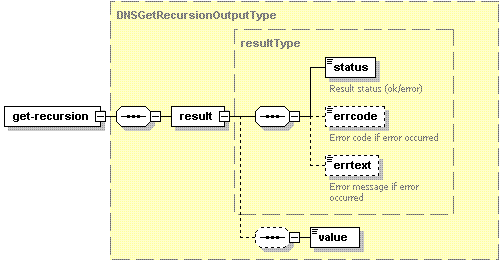This is documentation for Plesk Onyx.
Go to documentation for the latest version, Plesk Obsidian.
Retrieving Recursion Type
The get-recursion operation is used to retrieve a type of recursion.
Request Packet Structure
A request XML packet, that retrieves a type of recursion, includes the get-recursion operation node:
<packet version="1.6.7.0">
<dns>
<get-recursion/>
</dns>
</packet>
The graphical representation of the get-recursion node is as follows:

Note: The interactive schema navigator for all request packets is available here: http://plesk.github.io/api-schemas/1.6.8.0/agent_input.svg.
Response Packet Structure
The get-recursion node is presented by type
DNSGetRecursionOutputType (dns_output.xsd) and is structured as
follows:

Note: The interactive schema navigator for all response packets is available here: http://plesk.github.io/api-schemas/1.6.8.0/agent_output.svg.
- The result node is required. It wraps the information got from
the server. Data type: resultType (
common.xsd). - The status node is required. It specifies the execution status of the get-recursion operation. Data type: string. Allowed values: ok | error.
- The errcode node is optional. It is used to return the error code when the get-recursion operation fails. Data type: unsignedInt.
- The errtext node is optional. It is used to return the error message if the get-recursion operation fails. Data type: string.
- The value node is optional. It is used to return a type of recursion if the get-recursion operation succeeds. Data type: string.
Samples
This request packet retrieves the recursion type.
<packet version="1.6.7.0">
<dns>
<get-recursion/>
</dns>
</packet>
Response:
<packet version="1.6.7.0">
<dns>
<get-recursion>
<result>
<status>ok</status>
<value>on</value>
</result>
</get-recursion>
</dns>
</packet>